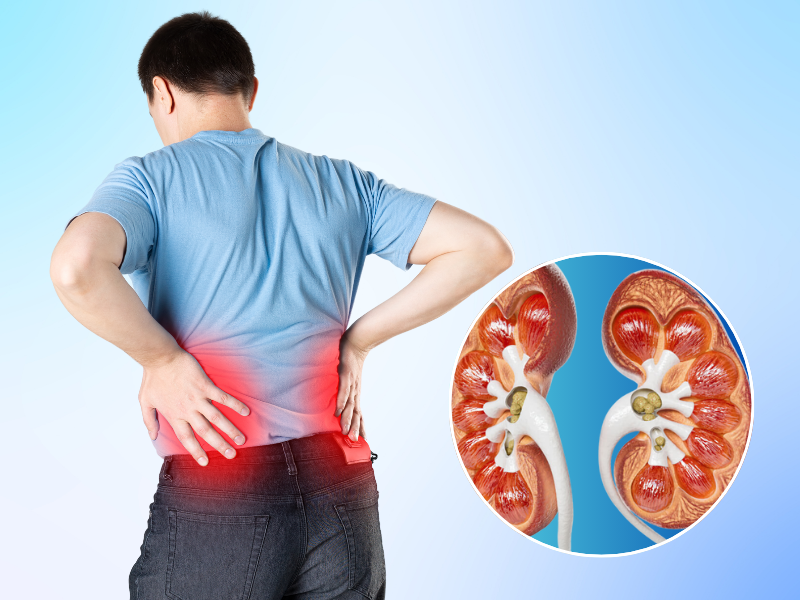Living with diabetes requires constant attention to various aspects of your health, from monitoring blood sugar levels to managing your diet. Diabetes is related to various other health disorders, including heart disease, eye disease, hearing impairment, and foot problems. However, one health concern that may not be as widely discussed is the potential link between diabetes and an increased risk of developing kidney stones. Understanding this connection is very important for those with diabetes to take proactive steps toward maintaining kidney health.
In this blog, our expert at Shree Shrinivasa Uro Care, renowned for kidney stone treatment in Bangalore, will explain how diabetes can contribute to the formation of kidney stones and offer practical prevention advice.
The Connection Between Diabetes and Kidney Stones
Kidney stones are hard deposits of minerals and salts that form inside the kidneys. They can cause significant pain and discomfort, particularly when passing through the urinary tract. The connection between diabetes and kidney stones is primarily linked to how diabetes affects the body's metabolism and urinary system.
People with diabetes, especially those with type 2 diabetes, are more likely to develop kidney stones due to several factors:
1. High Blood Sugar Levels: When blood sugar levels are consistently high, the kidneys have to work harder to filter excess glucose from the blood. This process can lead to higher levels of calcium, oxalate, and uric acid in the urine, which are the primary components of kidney stones.
2. Insulin Resistance: Insulin resistance, a hallmark of type 2 diabetes, can alter the balance of calcium and oxalate in the urine. This imbalance increases the likelihood of kidney stone formation.
3. Dehydration: Diabetes can lead to increased urination, which, if not managed with adequate fluid intake, can result in dehydration. Dehydration concentrates the urine, making it easier for minerals to crystallize and form stones.
4. Obesity and Diet: Many people with type 2 diabetes are also overweight or obese, which is a risk factor for kidney stones. Remember that consuming diets high in processed foods, sugars, and unhealthy fats can further elevate the risk.
Preventing Kidney Stones When You Have Diabetes
Given the increased risk, people with diabetes need to take preventive measures against kidney stones. Here are some practical tips:
1. Stay Hydrated:
Drinking plenty of water is one of the most effective ways to prevent kidney stones. Aim for at least 8-10 glasses of water a day. Proper hydration helps dilute the substances in your urine that can form stones.
2. Manage Blood Sugar Levels:
Keeping your blood sugar levels within the target range is crucial. Poorly controlled diabetes can increase the risk of kidney stones, so regular monitoring and adherence to your diabetes management plan are essential.
3. Adapt a Kidney-Friendly diet:
Certain foods can increase the risk of kidney stones. It's advisable to limit your intake of foods high in oxalate, such as spinach, nuts, and chocolate. Additionally, reducing your salt and animal protein intake can help prevent stone formation. Consult a dietitian for personalized dietary advice, especially if you have diabetes.
4. Regular Check-Ups:
Regular visits to your healthcare provider can help monitor your kidney function and detect any early signs of stone formation. They can also create personalized treatment options based on your needs.
5. Consider Medication:
In some cases, medication may be necessary to prevent kidney stones, particularly if you have a history of stones or are at high risk. Your doctor can prescribe medication that helps control the levels of substances in your urine that contribute to stone formation.
In summary, diabetes does increase the risk of developing kidney stones, but with careful management and preventive measures, this risk can be significantly reduced. Staying hydrated, managing your blood sugar, and being mindful of your diet are key strategies for maintaining kidney health. If you're concerned about kidney stones or have experienced symptoms, it's important to seek professional advice.
Schedule a consultation at Shree Shrinivasa Uro Care for kidney stone treatment in Bangalore. We can provide the necessary support and guidance to manage your diabetes and kidney health effectively.

